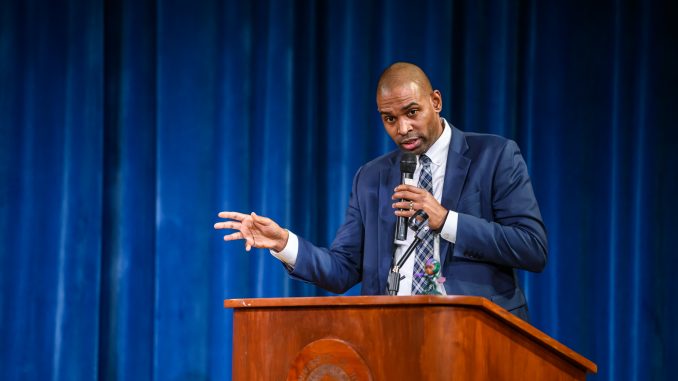
Many current New Paltz students never had Lt. Gov. Antonio Delgado as their congressman. It has been nearly three years since Gov. Kathy Hochul picked him from the House of Representatives to serve in the upper echelon of state government — and six years since his groundbreaking congressional feat. Delgado became the first person of Black or Latino heritage elected to Congress in upstate New York.
With the lieutenant governor’s accolades as a lawmaker and before his life in government (Delgado is a former Division I athlete at Colgate College, a University of Oxford Rhodes Scholar and Harvard Law School graduate), the Schenectady-native is a modern-day major player in the rich Black history of the Hudson Valley. On Feb. 19, he came to campus with the world’s second oldest Black Studies Department for the first time since 2019 to deliver the keynote address at the university’s second Black History Convocation. The night also featured remarks from students and faculty, dance and plenty of music in a celebration of New Paltz’s Black history — recognizing the students and professors who work and learn each day as part of its enduring legacy.
“We must have the courage to face our history, which in turn, can give us the strength to meet this moment,” Delgado said to the packed room.
“History teaches us the point is to account for the countless times very qualified people have been passed over due to their race, gender or ethnicity.”
Five days after his appearance on campus, Delgado announced he will not run on Hochul’s ticket as lieutenant governor for the upcoming gubernatorial election. His decision has prompted speculation over whether he will instead be running against the governor in the race. Standing on the Studley Theater stage, he said, “We would be wise in this moment to see the forest for the trees and reject those leaders who only fan the flames of hate, engage in fear-mongering, peddling conspiracy theories and scapegoat immigrant communities.”
“Moral cowardice is forbidden. We must draw strength and wisdom from our history,” he said. “Strength based on the fact that we have overcome far worse, and wisdom based on the recognition that it was love, not hate, that sought us through.”
Contributions to the convocation made by New Paltz students exemplified the strength and love Delgado encouraged. Third-year Black Studies and sociology major Leona Omozore, the co-president of the Black Student Union, gave the first speech of the night. “As we reflect on the stories of greatness and perseverance, let’s remember that Black history is not confined to one month, one moment or one event,” she said. “It is lived every day in the stories of our families, our communities and our peers.”
As several speakers addressed the crowd, a close-knit bond of the leading scholars that constitute Black Studies at New Paltz became apparent. The Chair of the Black Studies department Weldon McWilliams reflected on his friendship with Esi Lewis, the President of the Dr. Margaret Wade-Lewis Center. McWilliams met Lewis, who said “the Black Studies Department is my home,” when they attended Hampton University together 25 years ago.
“I want you, especially young people, to never forget where you came from,” Lewis said to the crowd. “Always refer to each other as kings and queens and brothers and sisters. Cherish and respect yourselves as royalty and your bodies, and make sure that others do the same.”
McWilliams also noted his decades long connection to Black Studies lecturer Anthony Dandridge. The notable department figures met 20 years ago at Temple University. Dandridge brought his students from the crowd into the convocation to share “moments in Black history.” A beloved campus character, he introduced his portion of the night to loud whoops from the crowd. “Black Studies does not merely examine or celebrate these contributions, it activates them,” he said. “Empowering students, scholars and activists to imagine them and participate in the continual project of rediscovering and reaffirming our shared humanity.”
“This discipline calls our universities and society at large to transform their understanding of history and justice, to educate not solely on what has been, but on what can and must be,” Dandridge said before students stood up from the audience and shared snippets of historical contributions made by Black history, sharing information about Black movements and ideas: from ancient Egypt about the goddess Maat — “the personification of truth, justice and the cosmic order,” to modern day Afrofuturism — “reimagining Black futures.”
Members of the Voices of Unity Gospel Choir sang “Revelation 19:1,” and Adjunct Black Studies professor Ceista Quinn, a recipient of the Dr. Zelbert Moore Legacy Award, addressed the crowd with an ease indicative of her life of musical greatness. Through a call-and-response technique, she helped the crowd pull off a moving rendition of the spiritual “I Know I’ve Been Changed.”
“The beautiful things about these spirituals is that the words are simple,” Quinn said. “The music of the African- American slave.”
Two more memorable moments of the night came from the students’ artistic expression. Third-year journalism major Quincy Simmons performed the poem “Lord, Why Did You Make Me Black” by Jada Giavanna Jones. The Golden Roots Afro-Beats Dance Team also performed on stage with students in the crowd cheering them on.
While the night spotlighted the lieutenant governor, the students, faculty and New Paltz leaders that came together were the heart of the celebration. “We’re making Black history every day,” Lewis said. “It’s really important that we honor and cherish that we are here.”

